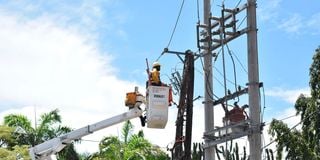Premium
Inside Parliament’s 6-point plan to bring down cost of electricity

Kenya Power personnel from the Live Line Team attend to a power issue.
Members of Parliament are exploring at least six ways of addressing the high cost electricity and taming Independent Power Producers (IPPs) who have been blamed for the high cost of power.
The National Assembly Committee on Energy is set to start investigating the high cost of electricity and present a report to the House within 120 days.
Among the ways being explored by the committee include not renewing any contracts of the IPPs currently in place, parliament involvement of signing contracts with IPPs, and payment of IPPs using local currency.
Others are splitting Kenya Power into six separate companies, each serving a specific section of the country, bringing on board new IPPs, negotiating lower costs with the new contractors and payment of power that has only been used. The investigation was ordered after the House passed a motion moved by Laikipia Woman Rep Jane Kagiri seeking to bar the Ministry of Energy and Kenya Power from getting into any new contracts with IPPs until investigations into the high cost power are complete.
Ms Kagiri has questioned the rationale of Kenya Power buying electricity from IPPs at a higher price than KenGen—the state-owned power producer.
Auditor-General Nancy Gathungu in her audit report covering the financial years between 2017/18 and 2020/21, indicates that the comparative cost of power purchase between KenGen and the IPPs indicates that it costs Kenya Power an average of Sh5.3 per KWh to buy from Kengen and Sh15.3 per KWh of from the IPPs.
According to the audited accounts for the financial year ended June 2021, KenGen supplied a total of 8,443 gigawatt hours of electricity and was paid Sh44.8 billion while IPPs only supplied 3,000 gigawatt hours, which translates to about 30 per cent of the total power, but were paid more than Sh56 billion.
In April, Electricity Consumers Society of Kenya (ECSK) decried the skewed contracts signed between Kenya Power and the IPPs.
ECSK Executive Director Issac Ndereba questioned why IPPs are selling their power with varied costs with some supplying at a cost of Sh26 per kilowatt yet KenGen is selling at Sh5 per Kilowatt.
Ms Kagiri now says there is a need to regulate all IPPs in the country and reveal their locations, stakeholders, directors, management and their addresses and agreements entered into with Kenya Power. In its meeting on Thursday with Ms Kagiri, the committee deliberated on a number of ways to address the high power cost and suggested splitting Kenya Power into different independent companies.
“For instance, we can have a company distributing power to areas like Eldoret, Busia and Siaya. This will increase efficiency,” said Gem MP Elisha Odhiambo.
MPs are considering not renewing any IPP contracts after they expire. Majority of the contracts were long term and will end in 2034. Committee chairman Vincent Musyoka said some IPPs are milking the country dry through their exorbitant prices.
The MPs said only new IPPs that are willing to sell power at a cheaper price will be considered by the government upon the expiry of the current contracts.
The committee is also considering compelling new IPPs to agree to payment in the local currency.
“We have found out that some of the IPPs are also producing power in other countries and are paid in local currencies. So why not us?” Ms Kagiri posed.
Most IPPs are paid in foreign currencies, mostly the US dollar and Euro, with MPs saying this contributes to the high cost of power. MPs are also seeking to compel IPPs to accept payment only for power consumed as opposed to the current situation where taxpayers pay the IPPs on power produced.
“We should stop giving licenses to such IPPs because, once they produce, the government must buy and at a high cost,” said Roysambu MP Augustine Kamande.
To further rein in IPPs, MPs are proposing that Parliament should be involved from the onset before the government signs any contract with any IPPs.
“We need to know who the directors of these companies are. We have a duty as a committee to give it our best shot so that we can unmask these skewed contracts,” Mr Musyoka said.
Despite supplying only 28 per cent of the power, IPPs account for 47 per cent of Kenya Power’s purchase costs. In April, the firms told the Senate Energy Committee that the cost of electricity will continue to be high unless there is a reduction in the high cost of fuel, removal of exorbitant taxes and fluctuations in the local currency against the dollar





